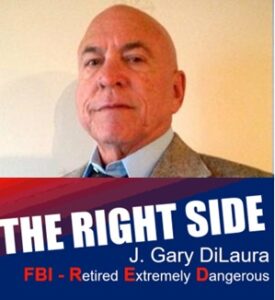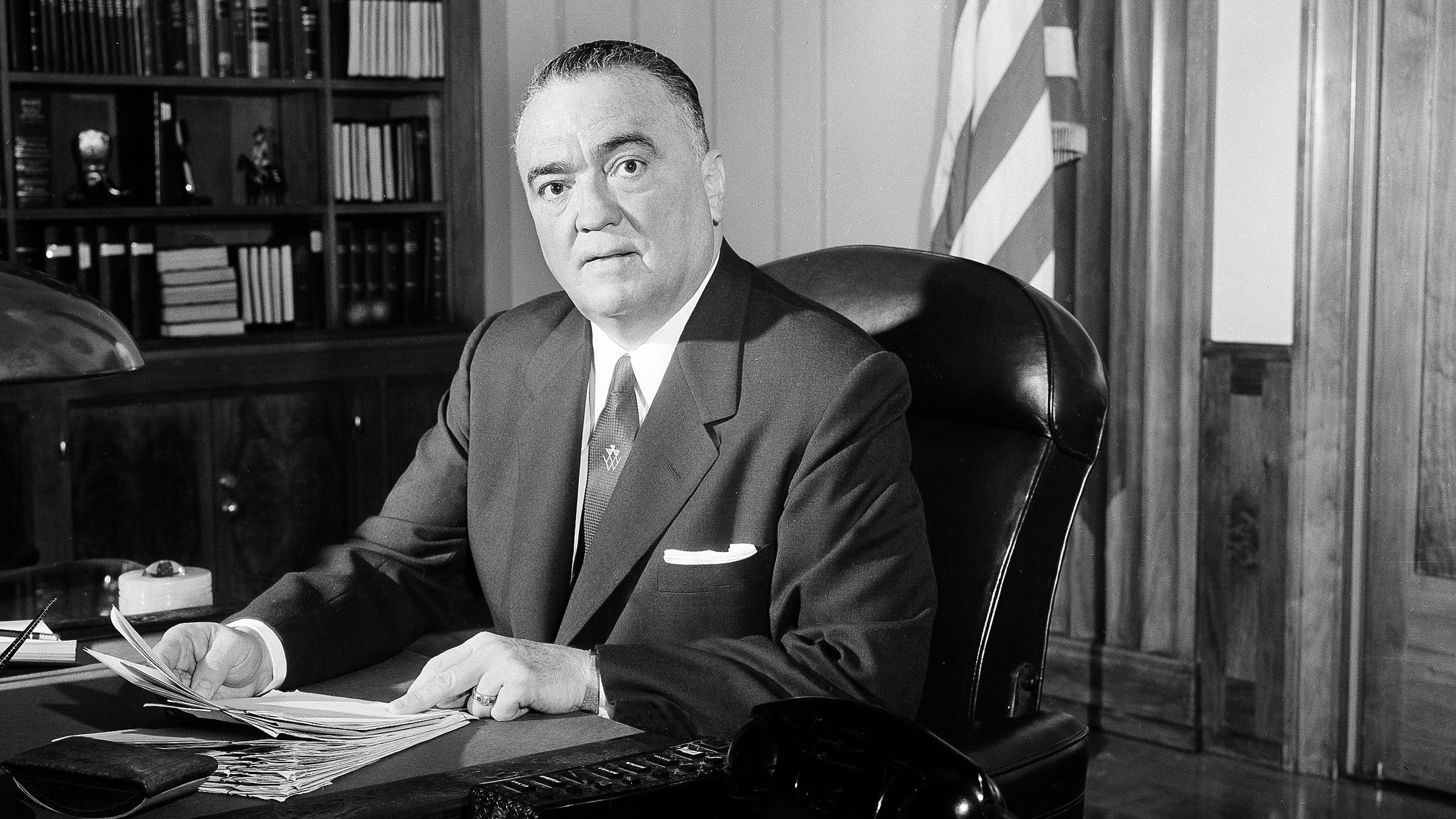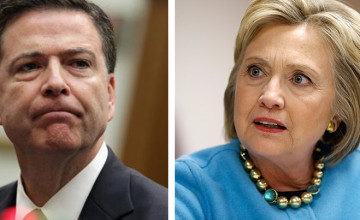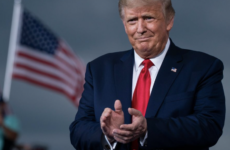DiLaura makes a compelling call to action to save America, the Republic, the Rule of Law, and the FBI from those prioritizing power and self-interest over the greater good.
Once renowned for its crime-fighting prowess, the FBI is now grappling with challenges stemming from politicized interests that disregard fundamental principles and the well-being of the American people.
DiLaura claims he has seen law enforcement agencies at all levels, from the Department of Justice to local police, become weaponized, impeding their ability to protect and serve the public effectively.
His solution: back to basics.
Deep Institutional Knowledge of the FBI and its History
J. Gary DiLaura, a man of action, was armed with a mechanical engineering degree and appointed by J. Edgar Hoover as a Special Agent for the FBI in ’69. He chased down violent criminals, foiled bank robberies, and thwarted armed truck hijackings.
From white-collar crimes to political and environmental offenses, he tackled them all. After three decades of upholding the law, DiLaura hung up his badge and ventured into the business world, again finding success.
The depth of DiLaura’s institutional and historical knowledge pours off the pages. He recounts how J. Edgar Hoover, who transformed the Bureau of Investigation into the Federal Bureau of Investigation in 1935, is widely credited with establishing the FBI as the world’s premier law enforcement agency.
Hoover placed a premium on hiring top talent and providing rigorous training for investigations, arrests, and convictions. He also recognized the significance of public involvement, informants, and on-the-job training.
In those days, the FBI worked on public interest cases, such as bank robbery, fugitives, and political corruption, and instituted programs like the Identification Order program and the FBI Top 10 Fugitive Program.
“Hoover wanted us to make arrests, recoveries, and get convictions. Our Forensics, Ident, and Firearms units were the best, and most Agents were dedicated,” DiLaura says. He continued, “Hoover knew that staying in the news through high-profile cases was the way to develop informants and learn investigative techniques.”
The former FBI special agent recounts that under Hoover’s leadership, the FBI remained nonpartisan and earned a reputation for its integrity. When Richard Nixon sought a position with the FBI after losing the presidential election, Hoover rejected his application and turned him away.
Former Special Agent DiLaura’s War Stories
DiLaura also recounts some of his “war stories” as an active special agent. In his first assignment in Charleston, South Carolina, the rookie agent “cut his teeth” on what he calls “action” cases: fugitives, bank robberies, thefts, and political corruption. And his book reads like an installment of “Lethal Weapon.”
“A car chase was underway as I raced after a fugitive in my police car, lights and sirens blaring. The agent from another RA had lost him, but I had a hunch he was headed for Myrtle Beach. I radioed another agent to cut him off, and we converged on the area simultaneously.”
“The fugitive bailed out, and we gave chase on foot. I confronted him in a hardware store, heart pounding, and he fired a shot at a chair I threw as a distraction. I got the drop on him and arrested him. The other agent never asked about the gunshot, and I didn’t mention it either, as I was already on my superior’s bad side for previous arrests,” DiLaura said.

Columnist J. Gary DiLaura is a decorated retired FBI special agent and author of the explosive new book “Action…FBI Crime Fighting the Way It Was!”
He also had cases that were extremely tough on all fronts. DiLaura had what has nowadays become a rare ability to separate the criminal from the crime and make judgment calls about people.
“I arrested a Marine Fugitive Deserter, which was unusual because Marines don’t desert. Despite being polite and respectful, this guy had four AK-47 entrance wounds on his front and four exit wounds on his back, a hero who almost made the ultimate sacrifice.”
“He told me his story – N. Vietnamese Regulars ambushed him, got hit but still managed to kill the enemy who shot him before going down. After recovering from his injuries, he left to be with his sick fiancée, even though he had only a few weeks left to muster out.”
“I promised to help him and took off his handcuffs to show my trust but put them back on before reaching the brig. I found an officer who got all the charges against him dismissed, reinstated him to his rank, and granted him an honorable discharge,” DiLaura recalls.
Armed and Extremely Dangerous Cop Killer
The vindicated soldier was grateful and gave DiLaura information about a cop killer in New York City, a black guy from Charleston who bragged about his crimes. DiLaura tried to inform his Senior Agent, who didn’t take him seriously and told him to “send a letter” to the New York field office. But special agent DiLaura knew it was for real.
“I told the senior agent what I had. I asked to call NYO (New York Office). He said no, he didn’t believe it. The senior agent said to send an ‘air-tell’ on blue paper to grab attention. I thought he was nuts, but I did it. Meanwhile, an alias hit matched my source. He was an IO (identification order) Fugitive.”
DiLaura explained IO Fugitives are where the “Wanted” posters you used to see in the post offices come from. They are violent, armed, and extremely dangerous subjects in “Fugitive” status for one year. The FBI’s Top 10’s come from IO lists.
“This guy was wanted for murder. He was a cop-killer, and that’s a big deal in the FBI. The SAC (senior special agent in charge) called and asked why I didn’t call NYO. I told him the senior agent made the call against my wishes.”
“The senior agent called me in, not happy. He blamed me for telling the big boss. I told him he should’ve worked real cases before becoming a boss and asking us to take the fall.”
DiLaura and his team located the extremely dangerous perp and prepared to move in.
“I got the team together, planning our approach. Despite my warnings about the suspect’s dangerous nature, the senior agent insisted on coming along.”
“We positioned ourselves at the front and back of the house, the senior agent standing in the doorway, hands on his belt, ordering me to holster my gun. I complied but kept my hand on the grip, ready for action. The door opened, and I pushed past the senior agent and went in, gun in hand.”
“I found the fugitive at the kitchen table, wearing a headset and eating cereal. I approached from behind, pulled off his headset, and ordered him to keep his hands on the table. But he made a move for his gun in his pocket, and I grabbed his hand just in time.”
“I called for backup, and a fight ensued. Eventually, we handcuffed him, only to discover that his gun was a realistic-looking cigarette lighter.”
Understandably, DiLaura was miffed at his senior agent. To boot, despite the danger and the stupidity of the fugitive’s actions, the senior agent didn’t want to press additional charges.
“The next day, I was called to headquarters, where the SAC congratulated me and commended my actions. He assured me he had my back and praised my achievements, mentioning that few agents in their career catch an IO fugitive and solve a police killing. He encouraged me to stay the course and keep doing what I’m doing,” DiLaura remembered fondly.
Myrtle Beach Bank Robbery
“The senior agent was still angry, but I didn’t know why and didn’t care. He should have had my back during the IO fugitive’s arrest. Then the news of the bank robbery came.”
The senior agent rallied the troops and gave assignments, except for DiLaura and his partner Dennis Wick.
“Dennis wanted to confront him, but I stopped him. I told Dennis that the senior agent had them all going in the wrong direction. Dennis laughed when he realized I was right. I spread out the map and found the intersection the suspect had to cross. We raced there, lights and siren blaring, Dennis telling me to slow down.”
They spotted the suspect’s car at a deli, engine running. DiLaura and his partner had outmaneuvered the senior agent and positioned themselves to block the suspect’s escape.
“SAC Trent called my signal number and asked about my plan. I said we could block the suspect in, not wanting a chase, but trap him in the car if he tried to engage us. Dennis would keep him pinned down while I flanked him. Trent told us to do what we had to do and be careful, with only Dennis and me talking on the air,” DiLaura recounts.
The two FBI special agents made a plan to cut off the suspect when he got in his car.
“We rolled out, Dennis barked orders as I ran for cover. Reinforcements arrived and took charge, asking me to provide cover. I closed in on the suspect, warning him not to move. I punched him and took him down without firing a shot. We recovered the shotgun and most of the money.”
Special Agent DiLaura and his partner were heroes who foiled a bank robbery without firing a shot. But not everyone was impressed.
“The senior agent, our supervisor, talked the boss out of giving us an Incentive Award, saying it was just an everyday arrest. It hurt, especially the money, as, at the time, $200 was a month’s worth of groceries for our families. That was a big difference from that guy’s higher salary,” DiLaura said, referring to the senior agent.
FBI Leadership
DiLaura is opinionated on recent FBI leadership. He believes the world’s premier law enforcement agency shouldn’t be run by people who have never made arrests or worked cases.
“In my perspective, James Comey, former FBI Director, stands out as one of the agency’s worst leaders in history. He openly admitted under oath to committing crimes such as lying and leaking, actions that severely undermined public trust in the FBI,” DiLaura said.
The retired special agent points to the former director’s flawed implementation of a phone answering system that severely hindered communication, possibly even contributing to tragic events like the Ft. Lauderdale School shooting.
DiLaura is adamant: “To effectively solve crimes, law enforcement must earn the trust of the American public and deal with criminals in an efficient and just manner.”
He cites an example of Al Gore’s lack of knowledge about Osama bin Laden during the Iran-Contra hearings to highlight the importance of being well-informed.
Mueller directed the FBI towards counterterrorism, but the author believes this should have been a temporary measure. “The old FBI had a robust security division that gathered intelligence and took action based on it,” DiLaura said.
The author highlights missed opportunities in preventing the 1993 Twin Towers bombing, citing the FBI’s failure to open a case on a blind Muslim cleric who preached violence and the denial of search warrants for Arab Islamic Muslims taking suspicious flying lessons citing religious reasons. He also mentions a Congressional investigation into the 9/11 attacks, where a Congresswoman questioned a Minneapolis Agent about sharing information with other agencies, to which he replied, “No.”
The author further criticizes the blunders by FBI and DOJ supervisors, including FBI Director Comey, Deputy McCabe, and ADIC Peter Strzok, who all signed FISA warrants based on false information from the Steele Dossier.
Back to Basics
In DiLaura’s opinion, the FBI has to get back to basics. Hoover’s core mission was to make arrests, recoveries, and get convictions. And the retired special agent has seen the FBI get away from those core goals in the last five decades. He blames it on FBI leadership that cuts corners on the proper procedures because they have never been in the field.
“In my experience as a former FBI agent, I’ve seen the importance of following proper procedure when obtaining search and arrest warrants. Every felony warrant we applied for had to be approved by a federal judge, as mandated by policy,” DiLaura states.
“Field offices do not present to magistrates, as they are not federal judges. However, I suspect that many agents today may not be aware of this fact. I’ve participated in numerous search warrants where we had to provide a copy of the warrant, leave a detailed inventory list, and allow the owner or their representative to observe the search, under Rule 41 of the Federal Rules of Criminal Procedure,” DiLaura continued.
The former special agent says these rules are in place to maintain the chain of custody and prevent errors. But recently, and all too often, these rules have not been strictly adhered to, especially in cases where the stakes are the highest.
A life defined by action, DiLaura’s legacy as a formidable FBI agent lives on. DiLaura’s prowess drips off the pages of his book and makes the reader seriously consider whether the way forward for American law enforcement is a “back to basics” approach. It is for this old-school cop.
























